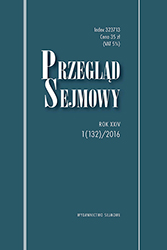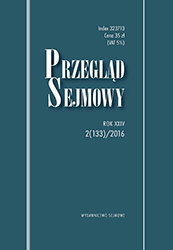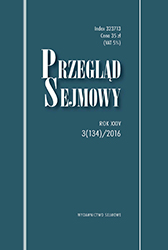
Przedmiotowy zakres ochrony działalności wchodzącej w zakres sprawowania mandatu parlamentarnego (art. 105 ust. 1 konstytucji)
Based on the assumption existing in the case law of the ECtHR, according to which freedom of activity of democratically elected members of parliament requires the level of protection necessary to ensure the implementation of democratic principles, the author provides an analysis of the regulations on the legal protection of MP’s activities which fall within the scope of the exercise of his/her parliamentary functions. In assessing the scope of this protection, a key role is played by the interpretation of the concept of “activities falling within the scope of a parliamentary mandate.” It includes any activity undertaken by an MP which is established in the existing legislation and consists in the performance of substantive powers or duties of the Deputy, regardless of whether it is conducted either within or outside Parliament. This notion does not encompass those actions that are not closely connected with the exercise of their mandate but, for example, are aimed at establishing an organizational framework for the exercise of the mandate or are taken by a Deputy acting as a private individual or a member of another State authority (e.g. the Council of Ministers, the National Council of the Judiciary). These so-defi ned parliamentary activities are protected primarily by the provision of Article 105 para. 1 of the Constitution and those provisions of the Act on the Exercise of the Mandate of a Deputy or Senator which establish parliamentary immunity, (including the so-called material immunity and formal immunity connected with it), applied only when MPs undertake activities falling within the scope of the mandate. Material immunity means non-accountability (non-liability) of a Deputy for above-mentioned acts, except where their actions infringe the rights of third parties. In the event that the activity of an MP, falling within the scope of the exercise of his/her parliamentary functions, violates the rights of third parties, substantive immunity will not be applied, and formal immunity (inviolability) may be used instead. In such case, the Deputy may be held responsible before court only upon consent given by the chamber of parliament. None of the examined types of immunity may be considered either as a right or freedom of the person.
More...

